Recluster fibroblast lineage
Belinda Phipson
10/28/2019
Last updated: 2019-10-28
Checks: 6 0
Knit directory: Porello-heart-snRNAseq/
This reproducible R Markdown analysis was created with workflowr (version 1.3.0). The Checks tab describes the reproducibility checks that were applied when the results were created. The Past versions tab lists the development history.
Great! Since the R Markdown file has been committed to the Git repository, you know the exact version of the code that produced these results.
Great job! The global environment was empty. Objects defined in the global environment can affect the analysis in your R Markdown file in unknown ways. For reproduciblity it’s best to always run the code in an empty environment.
The command set.seed(20190603) was run prior to running the code in the R Markdown file. Setting a seed ensures that any results that rely on randomness, e.g. subsampling or permutations, are reproducible.
Great job! Recording the operating system, R version, and package versions is critical for reproducibility.
Nice! There were no cached chunks for this analysis, so you can be confident that you successfully produced the results during this run.
Great! You are using Git for version control. Tracking code development and connecting the code version to the results is critical for reproducibility. The version displayed above was the version of the Git repository at the time these results were generated.
Note that you need to be careful to ensure that all relevant files for the analysis have been committed to Git prior to generating the results (you can use wflow_publish or wflow_git_commit). workflowr only checks the R Markdown file, but you know if there are other scripts or data files that it depends on. Below is the status of the Git repository when the results were generated:
Ignored files:
Ignored: .Rhistory
Ignored: .Rproj.user/
Untracked files:
Untracked: analysis/07b-DECardioFYA.Rmd
Untracked: analysis/PBapproachMarker-cardio.Rmd
Untracked: analysis/doublet-detection.Rmd
Untracked: broad_props.csv
Untracked: code/ReadDataObjects.R
Untracked: code/getTransformedProps.R
Untracked: data/adult-clust.txt
Untracked: data/dcm-clust.txt
Untracked: data/fetal-clust.txt
Untracked: data/gstlist-adult.Rdata
Untracked: data/gstlist-dcm-res03.Rdata
Untracked: data/gstlist-dcm.Rdata
Untracked: data/gstlist-fetal.Rdata
Untracked: data/gstlist-young.Rdata
Untracked: data/heart-markers-long.txt
Untracked: data/immune-markers-long.txt
Untracked: data/pseudobulk-pool.Rds
Untracked: data/pseudobulk.Rds
Untracked: data/targets_pools.txt
Untracked: data/young-clust.txt
Untracked: output/AllAdult-clustermarkers-v2.csv
Untracked: output/AllAdult-clustermarkers.csv
Untracked: output/AllFetal-clustermarkers.csv
Untracked: output/AllYoung-clustermarkers.csv
Untracked: output/Alldcm-clustermarkers.csv
Untracked: output/DEAnalysis/
Untracked: output/Figures/
Untracked: output/MarkerAnalysis/
Untracked: output/RDataObjects/
Untracked: output/cardio-numcells-clusters.csv
Untracked: output/cardio-numcells-clusters.txt
Untracked: output/fetal1-clustermarkers.csv
Untracked: output/fetal2-clustermarkers.csv
Untracked: output/fetal3-clustermarkers.csv
Untracked: output/heatmap-top10-adultmarkergenes.pdf
Untracked: output/young1-clustermarkers.csv
Unstaged changes:
Modified: analysis/01-QualityControl.Rmd
Modified: analysis/01a-DEpseudobulk.Rmd
Modified: analysis/02-ClusterFetal.Rmd
Modified: analysis/02c-ClusterFetal3.Rmd
Modified: analysis/03-ClusterYoung.Rmd
Modified: analysis/04-ClusterAdult.Rmd
Modified: analysis/07a-ClustCardioFYA.Rmd
Note that any generated files, e.g. HTML, png, CSS, etc., are not included in this status report because it is ok for generated content to have uncommitted changes.
These are the previous versions of the R Markdown and HTML files. If you’ve configured a remote Git repository (see ?wflow_git_remote), click on the hyperlinks in the table below to view them.
| File | Version | Author | Date | Message |
|---|---|---|---|---|
| Rmd | 43c81ad | Belinda Phipson | 2019-10-28 | Add fibroblast reclustering |
Load libraries and functions
library(edgeR)
library(RColorBrewer)
library(org.Hs.eg.db)
library(limma)
library(Seurat)
library(monocle)
library(cowplot)
library(DelayedArray)
library(scran)
library(NMF)
library(workflowr)
library(ggplot2)
library(clustree)
library(dplyr)source("/misc/card2-single_cell_nuclei_rnaseq/Porello-heart-snRNAseq/code/normCounts.R")
source("/misc/card2-single_cell_nuclei_rnaseq/Porello-heart-snRNAseq/code/findModes.R")
source("/misc/card2-single_cell_nuclei_rnaseq/Porello-heart-snRNAseq/code/ggplotColors.R")targets <- read.delim("/misc/card2-single_cell_nuclei_rnaseq/Porello-heart-snRNAseq/data/targets.txt",header=TRUE, stringsAsFactors = FALSE)
targets$FileName2 <- paste(targets$FileName,"/",sep="")
targets$Group_ID2 <- gsub("LV_","",targets$Group_ID)
group <- c("Fetal_1","Fetal_2","Fetal_3",
"Young_1","Young_2","Young_3",
"Adult_1","Adult_2","Adult_3",
"Diseased_1","Diseased_2",
"Diseased_3","Diseased_4")
m <- match(group, targets$Group_ID2)
targets <- targets[m,]fetal.integrated <- readRDS(file="./output/RDataObjects/fetal-int.Rds")
load(file="./output/RDataObjects/fetalObjs.Rdata")
young.integrated <- readRDS(file="./output/RDataObjects/young-int.Rds")
load(file="./output/RDataObjects/youngObjs.Rdata")
adult.integrated <- readRDS(file="./output/RDataObjects/adult-int.Rds")
load(file="./output/RDataObjects/adultObjs.Rdata")Set default clustering resolution
# Default 0.3
Idents(fetal.integrated) <- fetal.integrated$integrated_snn_res.0.3
DimPlot(fetal.integrated, reduction = "tsne",label=TRUE,label.size = 6)+NoLegend()
# Default 0.3
DimPlot(young.integrated, reduction = "tsne",label=TRUE,label.size = 6)+NoLegend()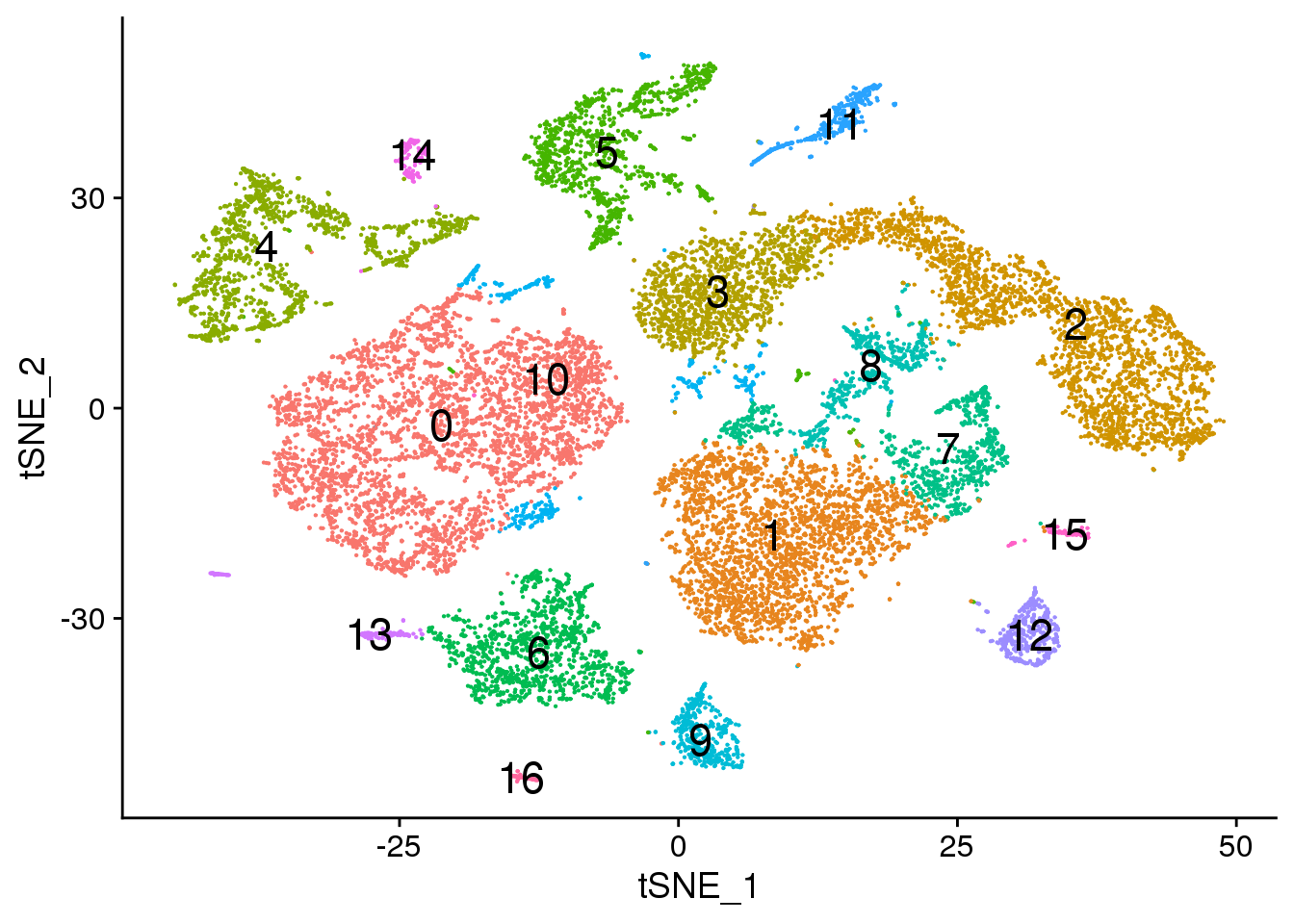
# Default 0.6
DimPlot(adult.integrated, reduction = "tsne",label=TRUE,label.size = 6)+NoLegend()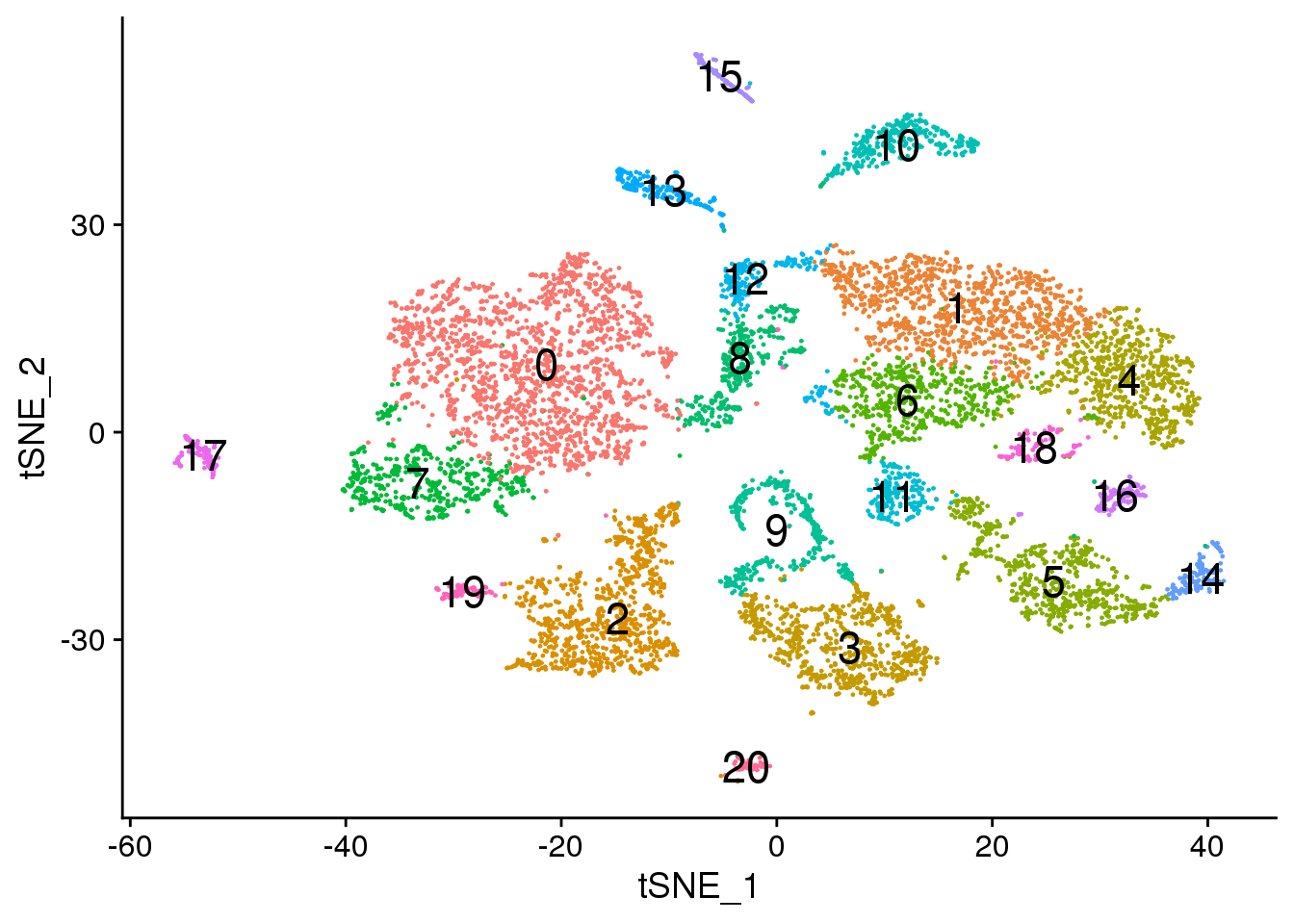
Merge all data together
heart <- merge(fetal.integrated, y = c(young.integrated, adult.integrated), project = "heart")
table(heart$orig.ident)
adult fetal young
9416 27760 16964 DefaultAssay(object = heart) <- "RNA"Get fibroblast cells only
fibro <- subset(heart,subset = Broad_celltype == "Fibroblast")Filter out crappy cells
Check for cells with very low number of uniquely detected genes.
par(mfrow=c(1,2))
plot(density(fibro$nFeature_RNA),main="Number of genes detected")
abline(v=500,col=2)
plot(density(fibro$nCount_RNA),main="Library size")
abline(v=2500,col=2)
fibro <- subset(fibro, subset = nFeature_RNA > 500 & nCount_RNA > 2500)
dim(fibro)[1] 17926 9097table(fibro$biorep)
a1 a2 a3 f1 f2 f3 y1 y2 y3
963 951 421 1025 750 1194 1569 1504 720 Run new integration with SCtransform normalisation
fibro.list <- SplitObject(fibro, split.by = "biorep")for (i in 1:length(fibro.list)) {
fibro.list[[i]] <- SCTransform(fibro.list[[i]], verbose = FALSE)
}kf <- min(sapply(fibro.list, ncol))
fibro.anchors <- FindIntegrationAnchors(object.list = fibro.list, dims=1:30,anchor.features = 3000,k.filter=kf)
fibro.integrated <- IntegrateData(anchorset = fibro.anchors,dims=1:30)Perform clustering
DefaultAssay(object = fibro.integrated) <- "integrated"Perform scaling and PCA
fibro.integrated <- ScaleData(fibro.integrated, verbose = FALSE)
fibro.integrated <- RunPCA(fibro.integrated, npcs = 50, verbose = FALSE)
ElbowPlot(fibro.integrated,ndims=50)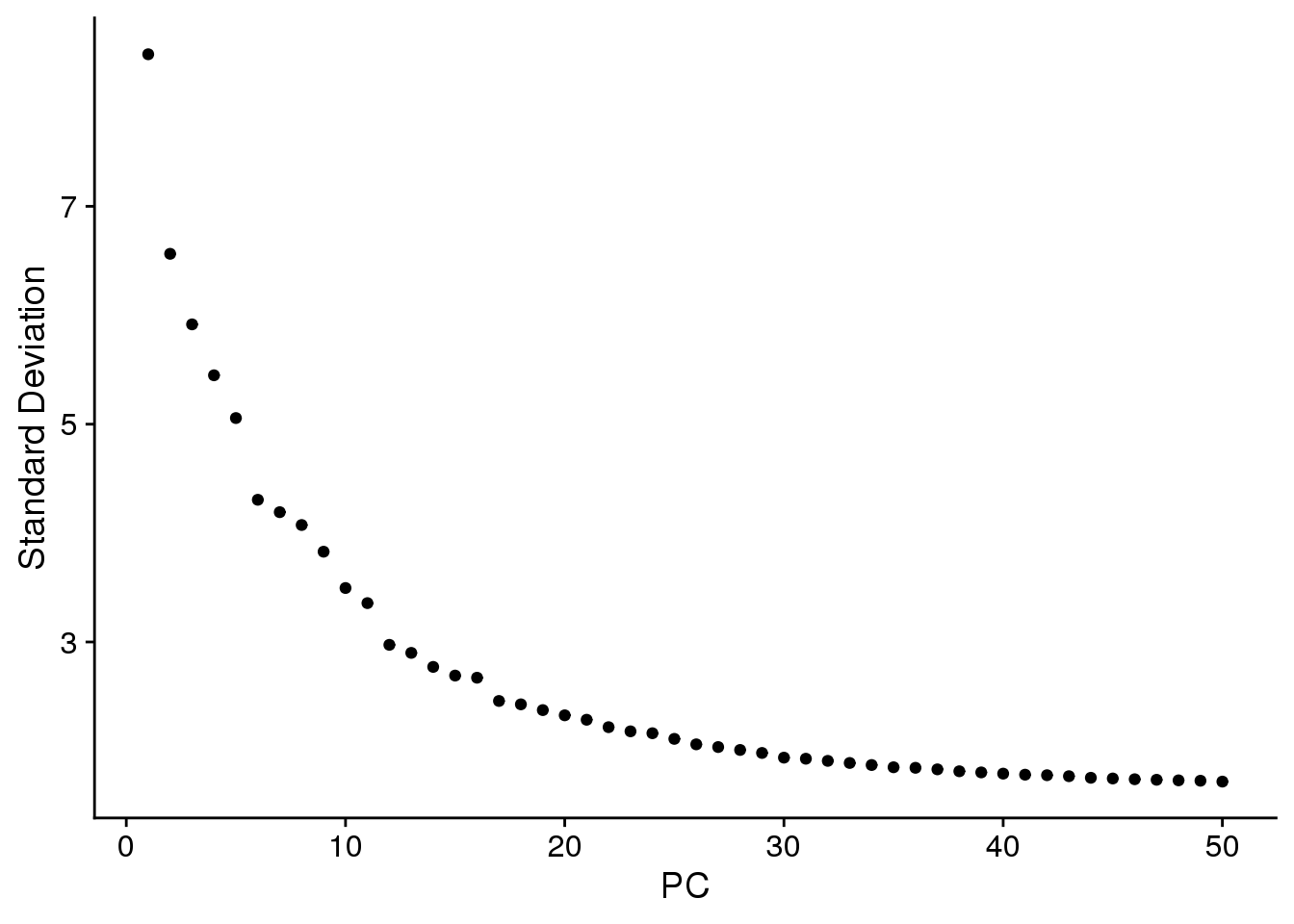
VizDimLoadings(fibro.integrated, dims = 1:4, reduction = "pca")
DimPlot(fibro.integrated, reduction = "pca",group.by="orig.ident")
DimPlot(fibro.integrated, reduction = "pca",group.by="biorep")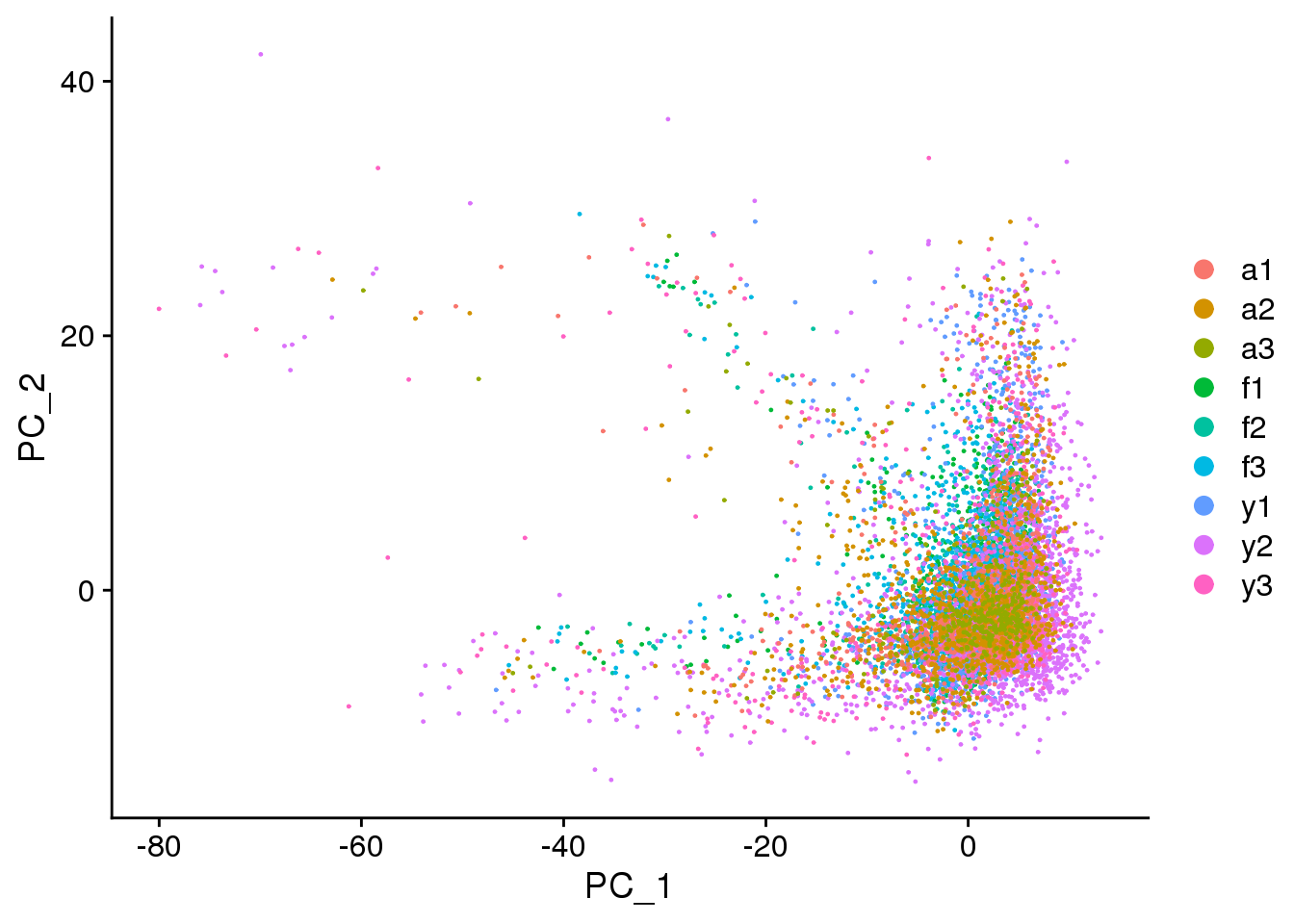
DimPlot(fibro.integrated, reduction = "pca",group.by="sex")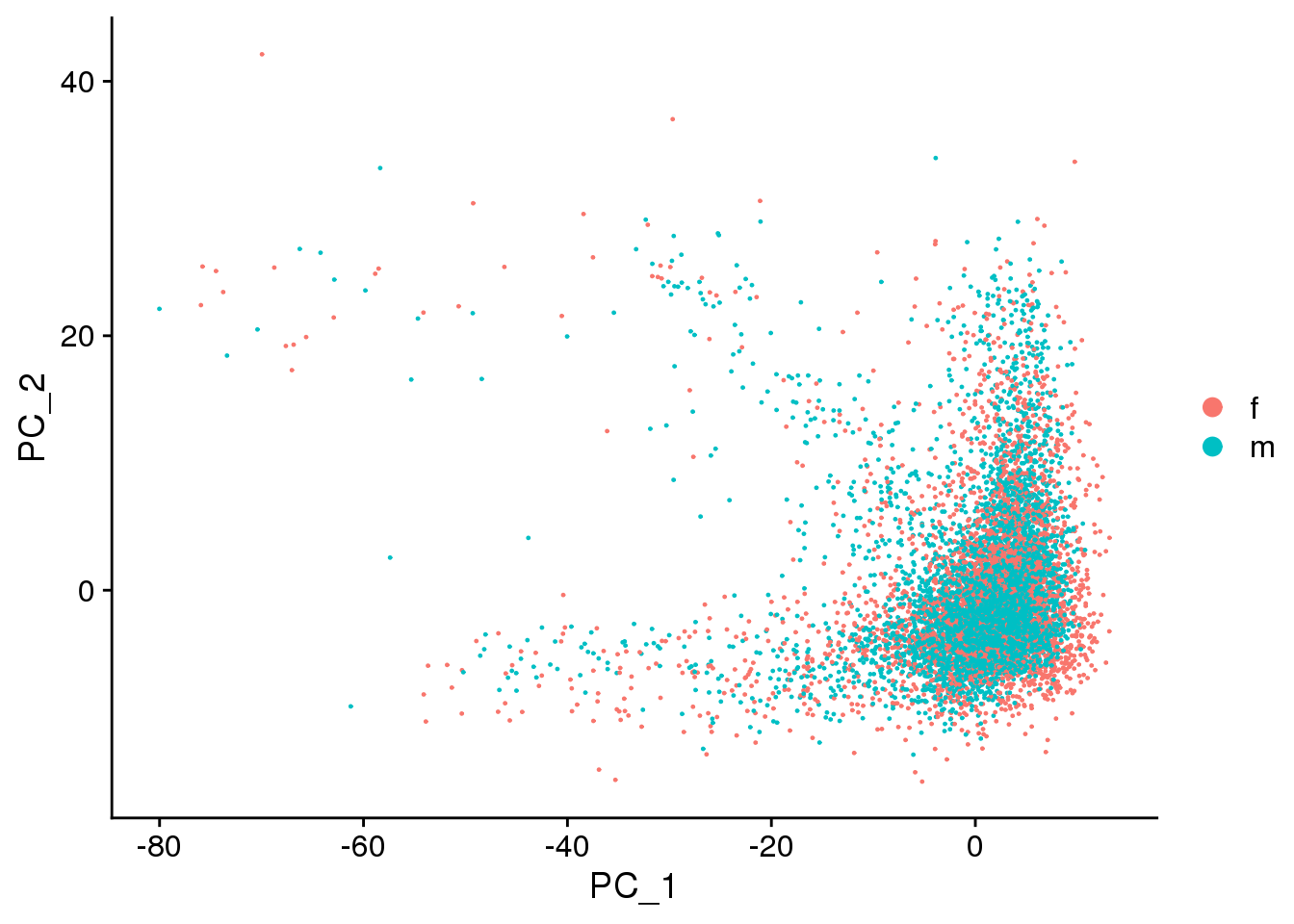
DimPlot(fibro.integrated, reduction = "pca",group.by="batch")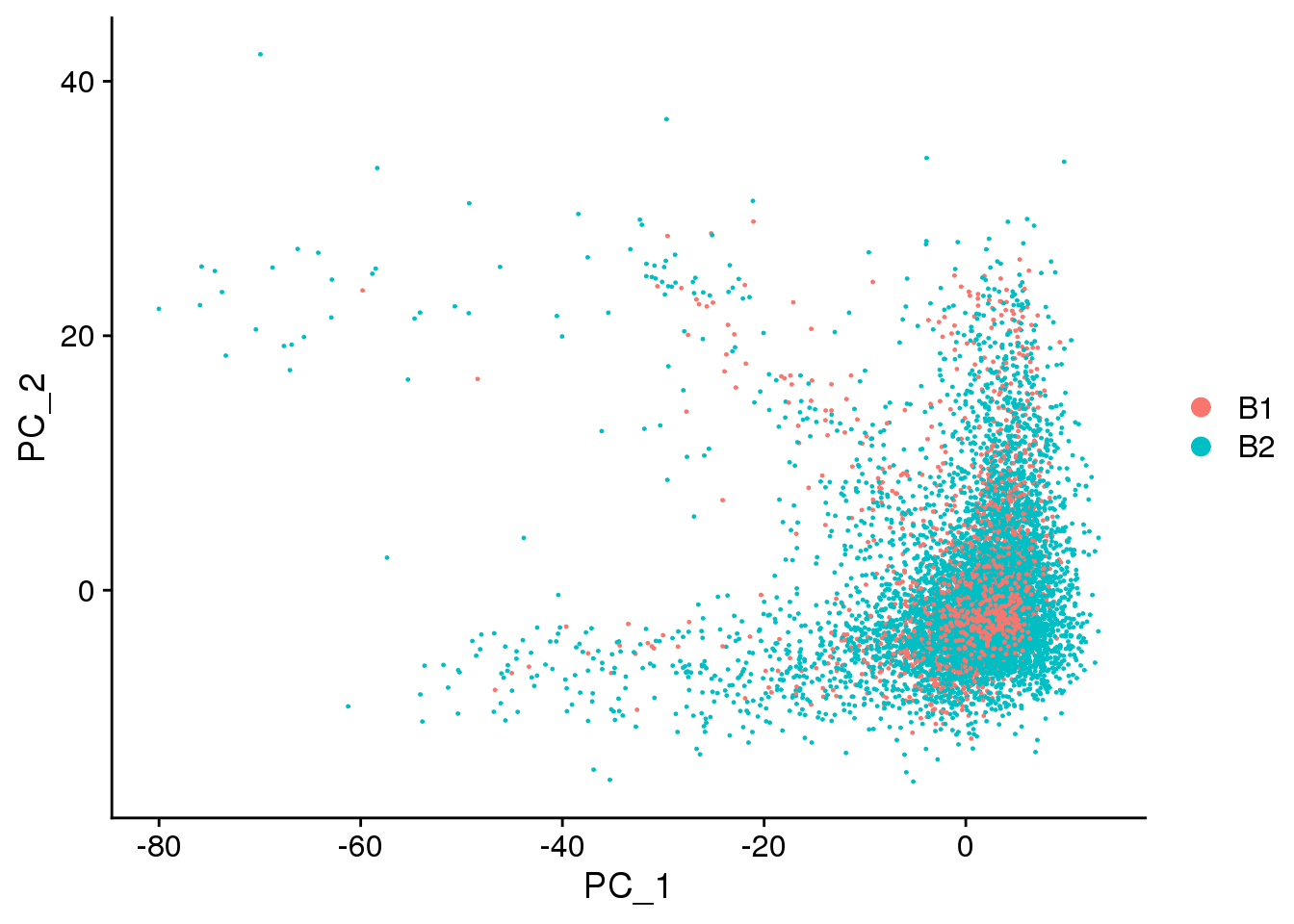
DimHeatmap(fibro.integrated, dims = 1:15, cells = 500, balanced = TRUE)
DimHeatmap(fibro.integrated, dims = 16:30, cells = 500, balanced = TRUE)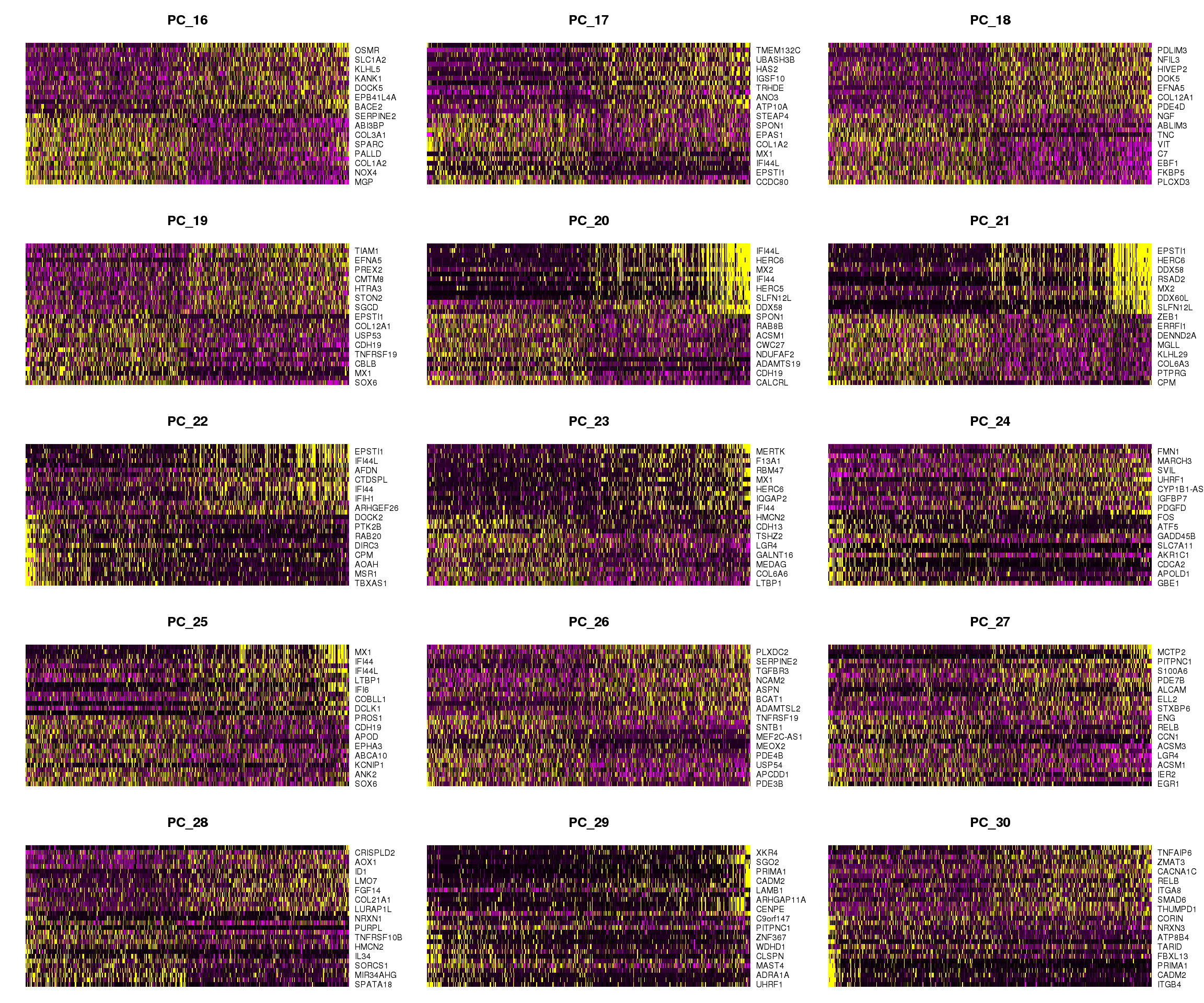
DimHeatmap(fibro.integrated, dims = 31:45, cells = 500, balanced = TRUE)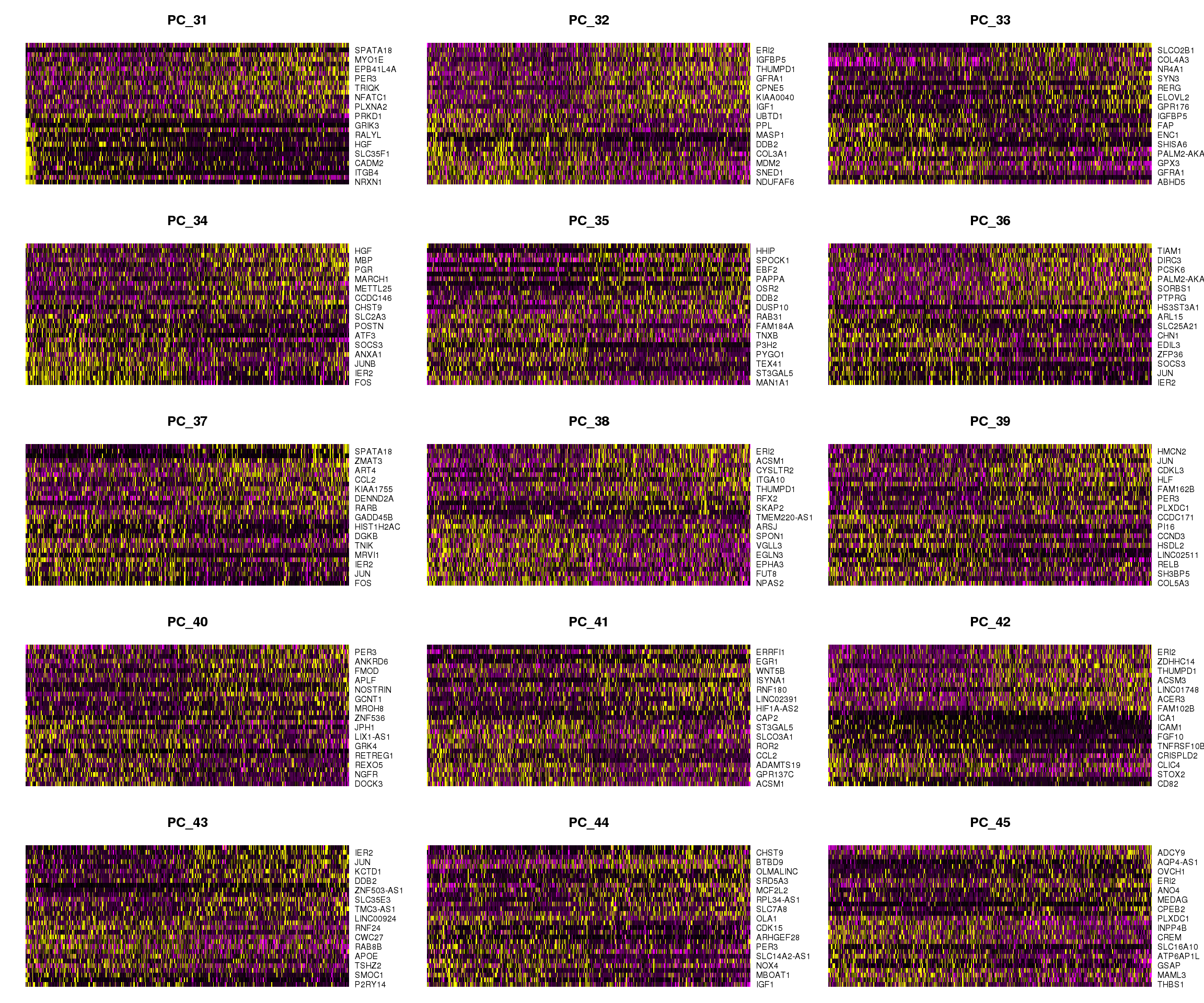
Perform nearest neighbours clustering
fibro.integrated <- FindNeighbors(fibro.integrated, dims = 1:20)
fibro.integrated <- FindClusters(fibro.integrated, resolution = 0.1)Modularity Optimizer version 1.3.0 by Ludo Waltman and Nees Jan van Eck
Number of nodes: 9097
Number of edges: 349269
Running Louvain algorithm...
Maximum modularity in 10 random starts: 0.9193
Number of communities: 6
Elapsed time: 1 secondstable(Idents(fibro.integrated))
0 1 2 3 4 5
7784 579 315 187 176 56 par(mfrow=c(1,1))
par(mar=c(5,4,2,2))
barplot(table(Idents(fibro.integrated)),ylab="Number of cells",xlab="Clusters")
title("Number of cells in each cluster")
Visualisation with TSNE
set.seed(10)
fibro.integrated <- RunTSNE(fibro.integrated, reduction = "pca", dims = 1:20)DimPlot(fibro.integrated, reduction = "tsne",label=TRUE,label.size = 6,pt.size = 0.5)+NoLegend()
pdf(file="./output/Figures/tsne-fibroALL-res01.pdf",width=10,height=8,onefile = FALSE)
DimPlot(fibro.integrated, reduction = "tsne",label=TRUE,label.size = 6,pt.size = 0.5)+NoLegend()
dev.off()png
2 DimPlot(fibro.integrated, reduction = "tsne", group.by = "orig.ident")
DimPlot(fibro.integrated, reduction = "tsne", split.by = "orig.ident")
DimPlot(fibro.integrated, reduction = "tsne", group.by = "biorep")
DimPlot(fibro.integrated, reduction = "tsne", group.by = "sex")
DimPlot(fibro.integrated, reduction = "tsne", split.by = "sex")
DimPlot(fibro.integrated, reduction = "tsne", group.by = "batch")
par(mfrow=c(1,1))
par(mar=c(4,4,2,2))
tab <- table(Idents(fibro.integrated),fibro.integrated$biorep)
barplot(t(tab/rowSums(tab)),beside=TRUE,col=ggplotColors(9),legend=TRUE)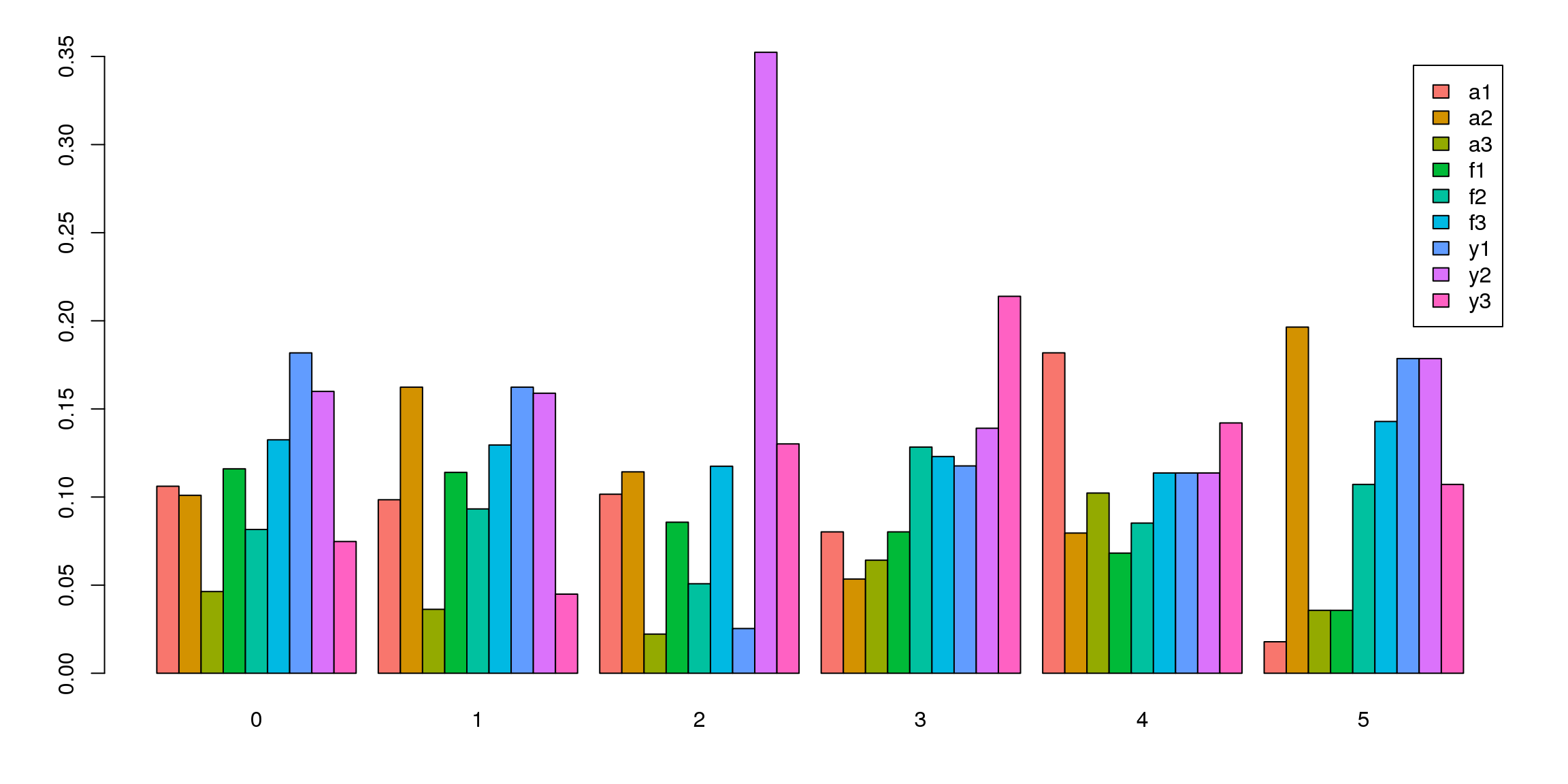
par(mfrow=c(1,1))
par(mar=c(4,4,2,2))
tab <- table(Idents(fibro.integrated),fibro.integrated$orig.ident)
barplot(t(tab/rowSums(tab)),beside=TRUE,col=ggplotColors(3))
legend("topleft",legend=colnames(tab),fill=ggplotColors(3))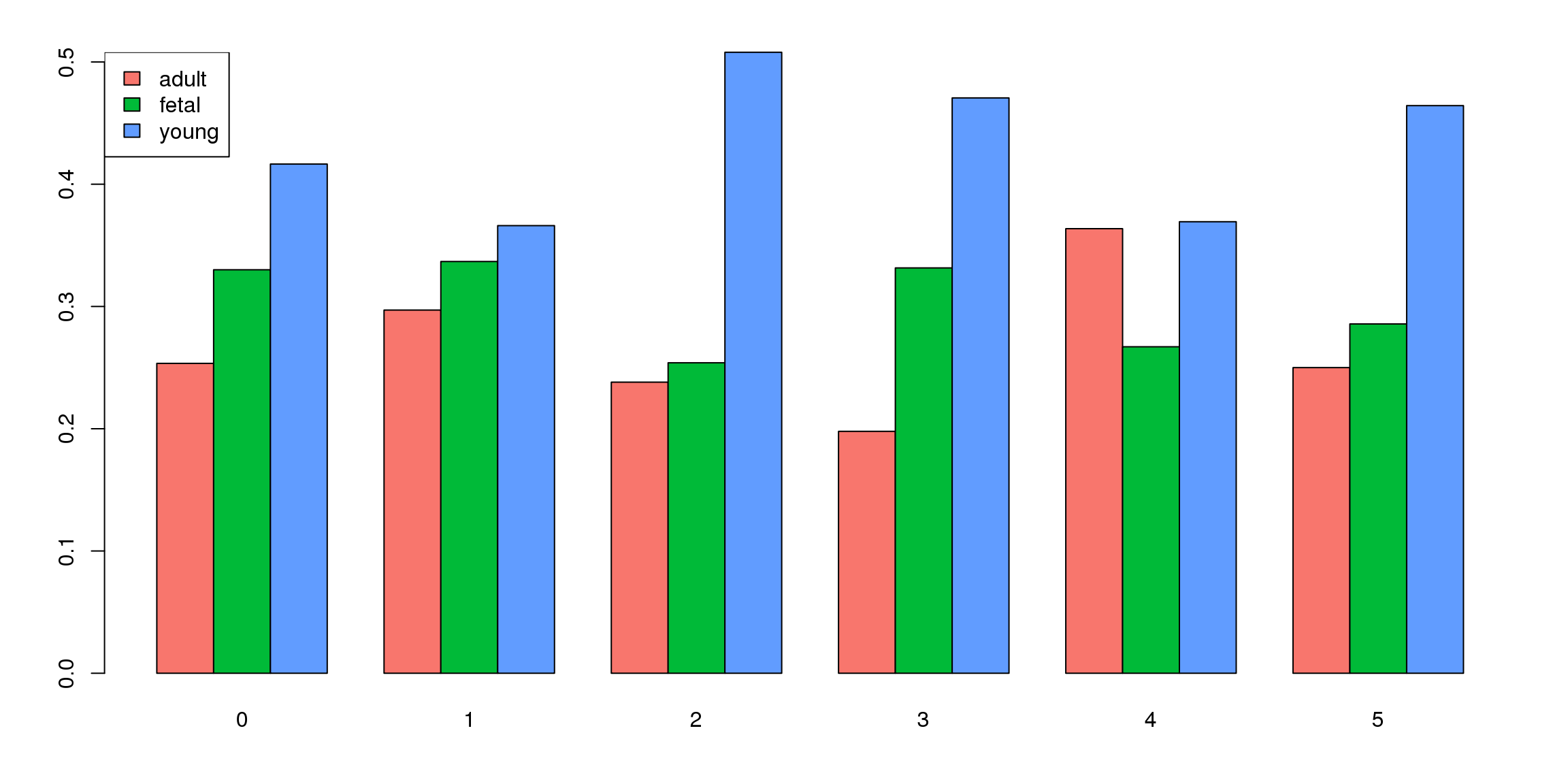
Visualisation with clustree
clusres <- c(0.1,0.2,0.3,0.4,0.5,0.6,0.7,0.8,0.9,1,1.1,1.2)for(i in 1:length(clusres)){
fibro.integrated <- FindClusters(fibro.integrated,
resolution = clusres[i])
}Modularity Optimizer version 1.3.0 by Ludo Waltman and Nees Jan van Eck
Number of nodes: 9097
Number of edges: 349269
Running Louvain algorithm...
Maximum modularity in 10 random starts: 0.9193
Number of communities: 6
Elapsed time: 1 seconds
Modularity Optimizer version 1.3.0 by Ludo Waltman and Nees Jan van Eck
Number of nodes: 9097
Number of edges: 349269
Running Louvain algorithm...
Maximum modularity in 10 random starts: 0.8844
Number of communities: 8
Elapsed time: 1 seconds
Modularity Optimizer version 1.3.0 by Ludo Waltman and Nees Jan van Eck
Number of nodes: 9097
Number of edges: 349269
Running Louvain algorithm...
Maximum modularity in 10 random starts: 0.8579
Number of communities: 8
Elapsed time: 1 seconds
Modularity Optimizer version 1.3.0 by Ludo Waltman and Nees Jan van Eck
Number of nodes: 9097
Number of edges: 349269
Running Louvain algorithm...
Maximum modularity in 10 random starts: 0.8377
Number of communities: 10
Elapsed time: 1 seconds
Modularity Optimizer version 1.3.0 by Ludo Waltman and Nees Jan van Eck
Number of nodes: 9097
Number of edges: 349269
Running Louvain algorithm...
Maximum modularity in 10 random starts: 0.8213
Number of communities: 11
Elapsed time: 1 seconds
Modularity Optimizer version 1.3.0 by Ludo Waltman and Nees Jan van Eck
Number of nodes: 9097
Number of edges: 349269
Running Louvain algorithm...
Maximum modularity in 10 random starts: 0.8044
Number of communities: 12
Elapsed time: 1 seconds
Modularity Optimizer version 1.3.0 by Ludo Waltman and Nees Jan van Eck
Number of nodes: 9097
Number of edges: 349269
Running Louvain algorithm...
Maximum modularity in 10 random starts: 0.7901
Number of communities: 14
Elapsed time: 1 seconds
Modularity Optimizer version 1.3.0 by Ludo Waltman and Nees Jan van Eck
Number of nodes: 9097
Number of edges: 349269
Running Louvain algorithm...
Maximum modularity in 10 random starts: 0.7779
Number of communities: 15
Elapsed time: 1 seconds
Modularity Optimizer version 1.3.0 by Ludo Waltman and Nees Jan van Eck
Number of nodes: 9097
Number of edges: 349269
Running Louvain algorithm...
Maximum modularity in 10 random starts: 0.7684
Number of communities: 17
Elapsed time: 1 seconds
Modularity Optimizer version 1.3.0 by Ludo Waltman and Nees Jan van Eck
Number of nodes: 9097
Number of edges: 349269
Running Louvain algorithm...
Maximum modularity in 10 random starts: 0.7594
Number of communities: 20
Elapsed time: 1 seconds
Modularity Optimizer version 1.3.0 by Ludo Waltman and Nees Jan van Eck
Number of nodes: 9097
Number of edges: 349269
Running Louvain algorithm...
Maximum modularity in 10 random starts: 0.7515
Number of communities: 20
Elapsed time: 1 seconds
Modularity Optimizer version 1.3.0 by Ludo Waltman and Nees Jan van Eck
Number of nodes: 9097
Number of edges: 349269
Running Louvain algorithm...
Maximum modularity in 10 random starts: 0.7456
Number of communities: 19
Elapsed time: 1 secondspct.male <- function(x) {mean(x=="m")}
pct.female <- function(x) {mean(x=="f")}
pct.fetal <- function(x) {mean(x=="fetal")}
pct.young <- function(x) {mean(x=="young")}
pct.adult <- function(x) {mean(x=="adult")}clustree(fibro.integrated, prefix = "integrated_snn_res.")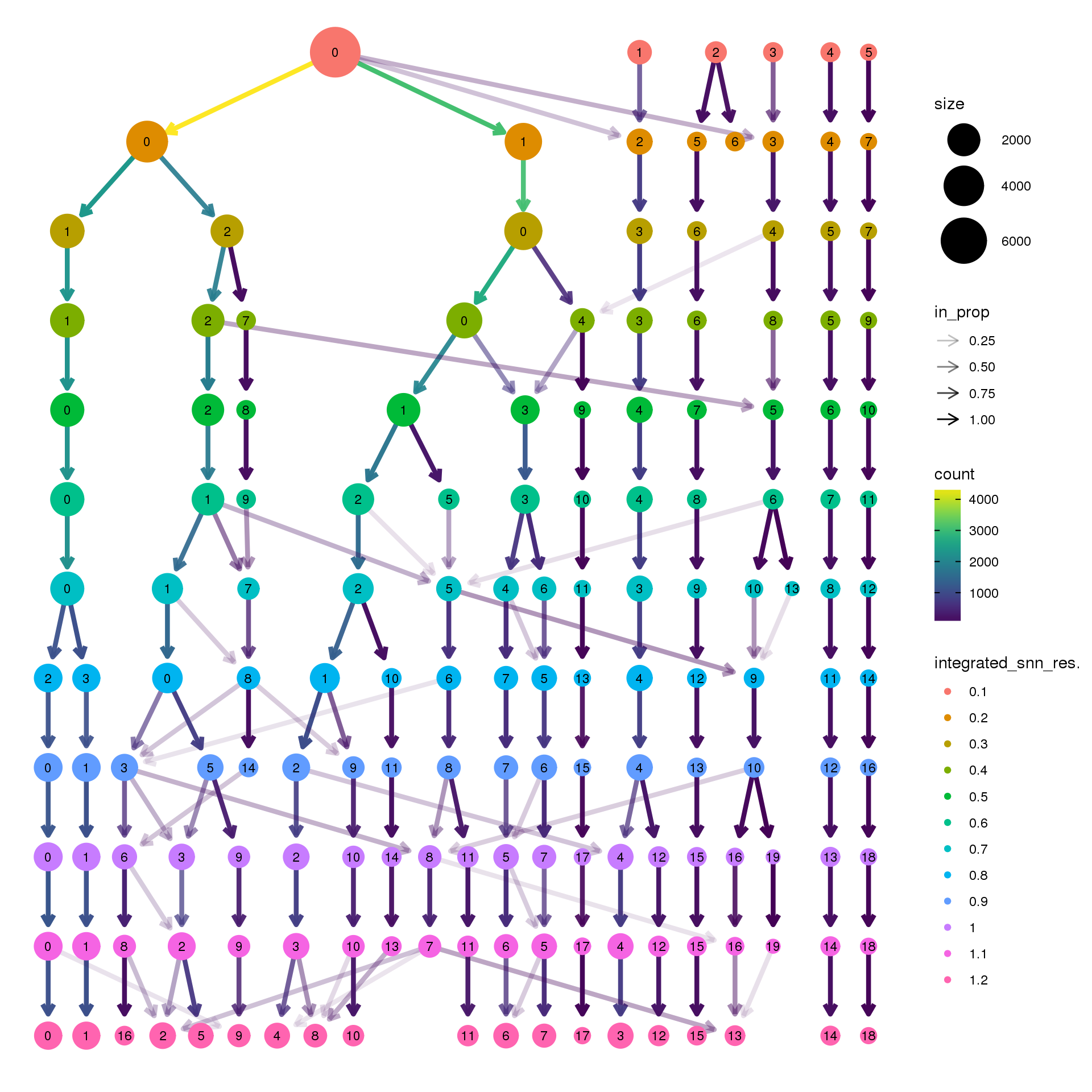
clustree(fibro.integrated, prefix = "integrated_snn_res.",
node_colour = "sex", node_colour_aggr = "pct.female",assay="RNA")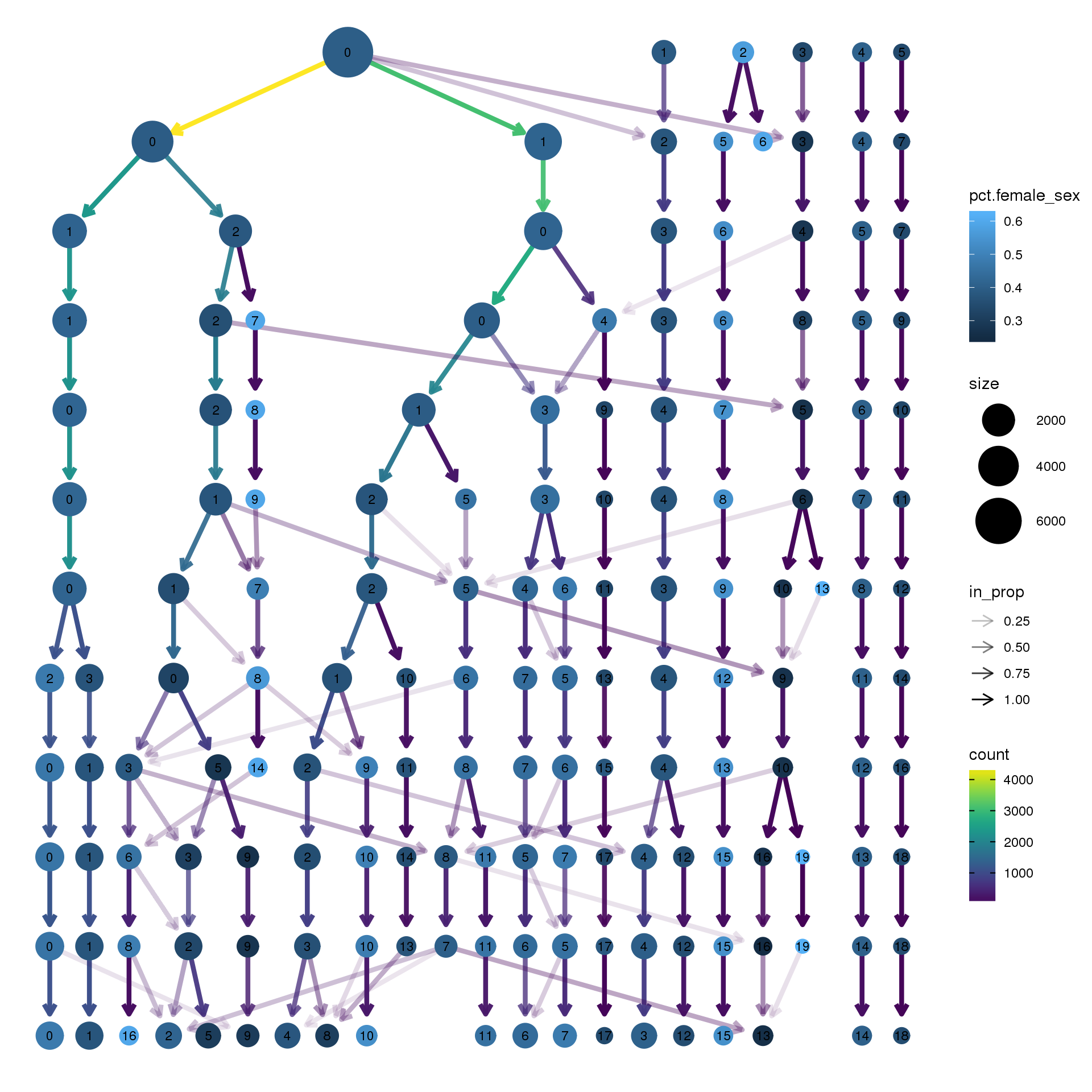
clustree(fibro.integrated, prefix = "integrated_snn_res.",
node_colour = "sex", node_colour_aggr = "pct.male",assay="RNA")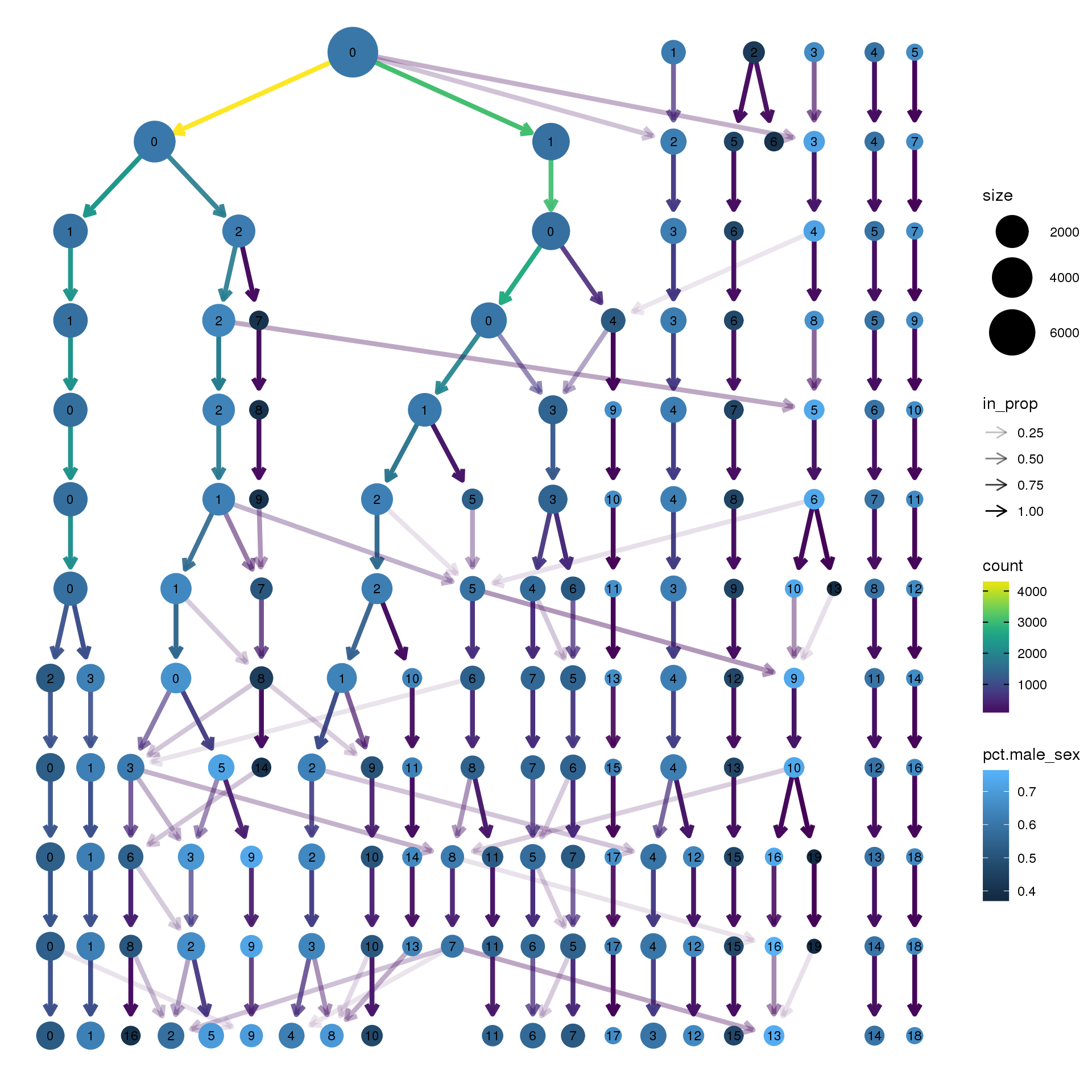
clustree(fibro.integrated, prefix = "integrated_snn_res.",
node_colour = "orig.ident", node_colour_aggr = "pct.fetal",assay="RNA")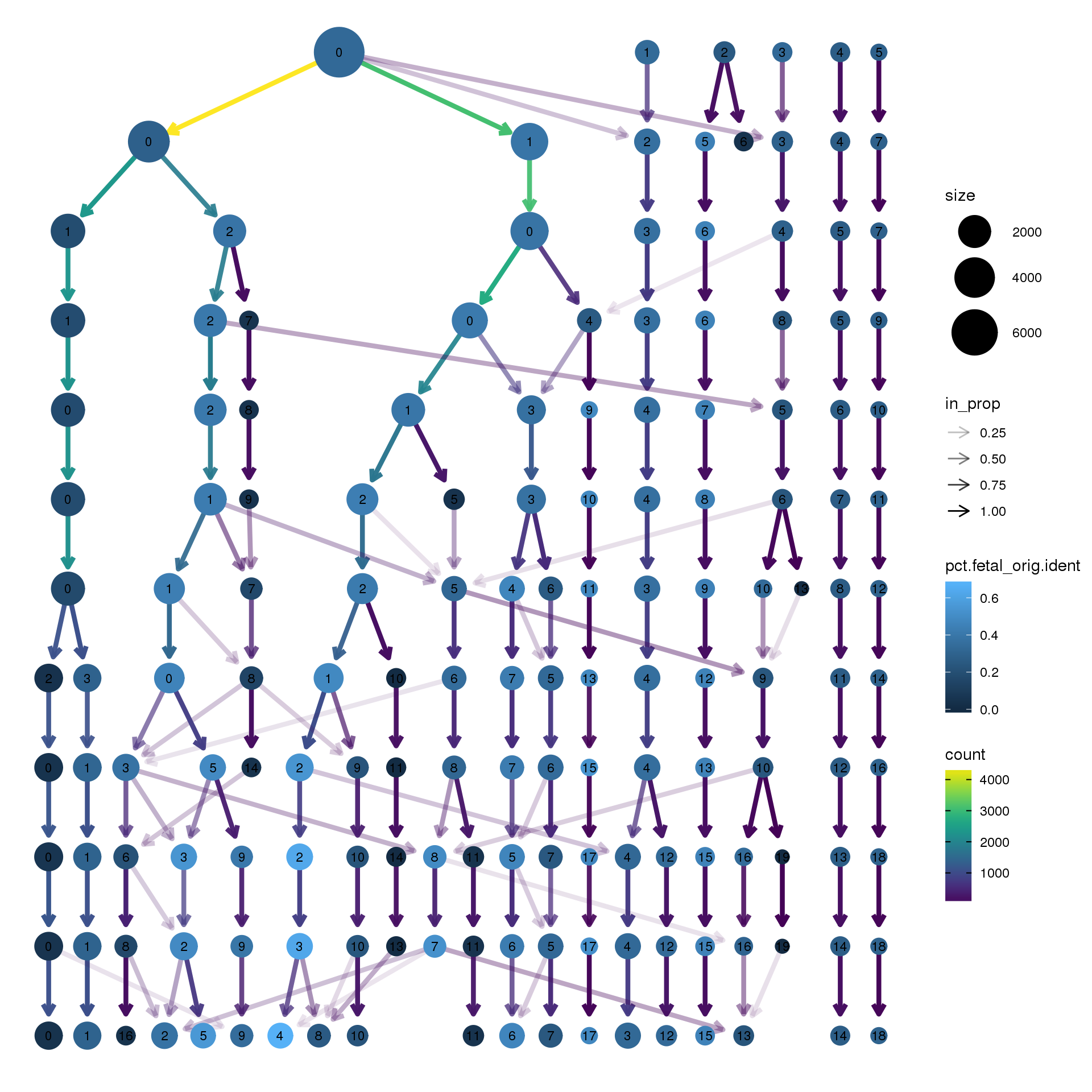
clustree(fibro.integrated, prefix = "integrated_snn_res.",
node_colour = "orig.ident", node_colour_aggr = "pct.young",assay="RNA")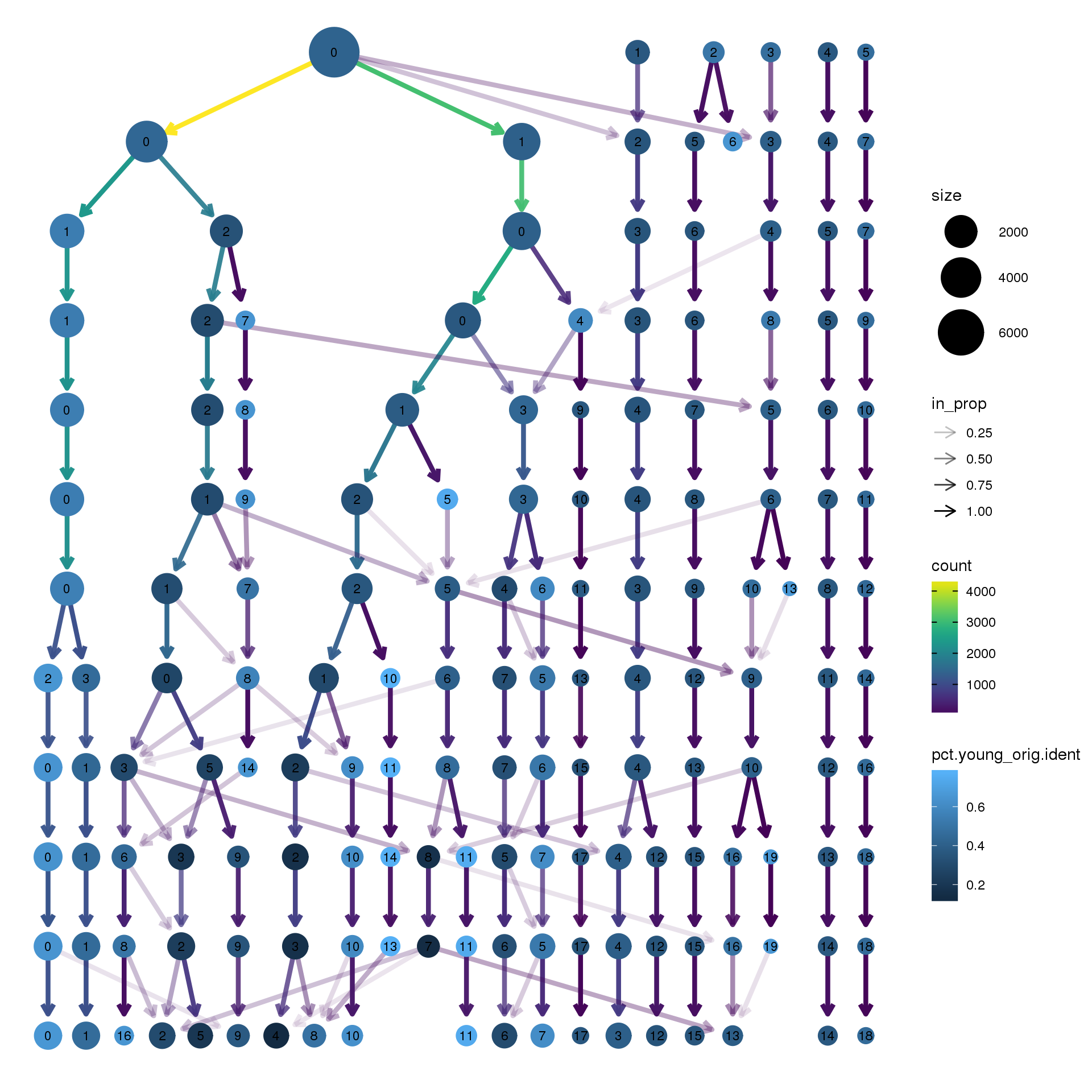
clustree(fibro.integrated, prefix = "integrated_snn_res.",
node_colour = "orig.ident", node_colour_aggr = "pct.adult",assay="RNA")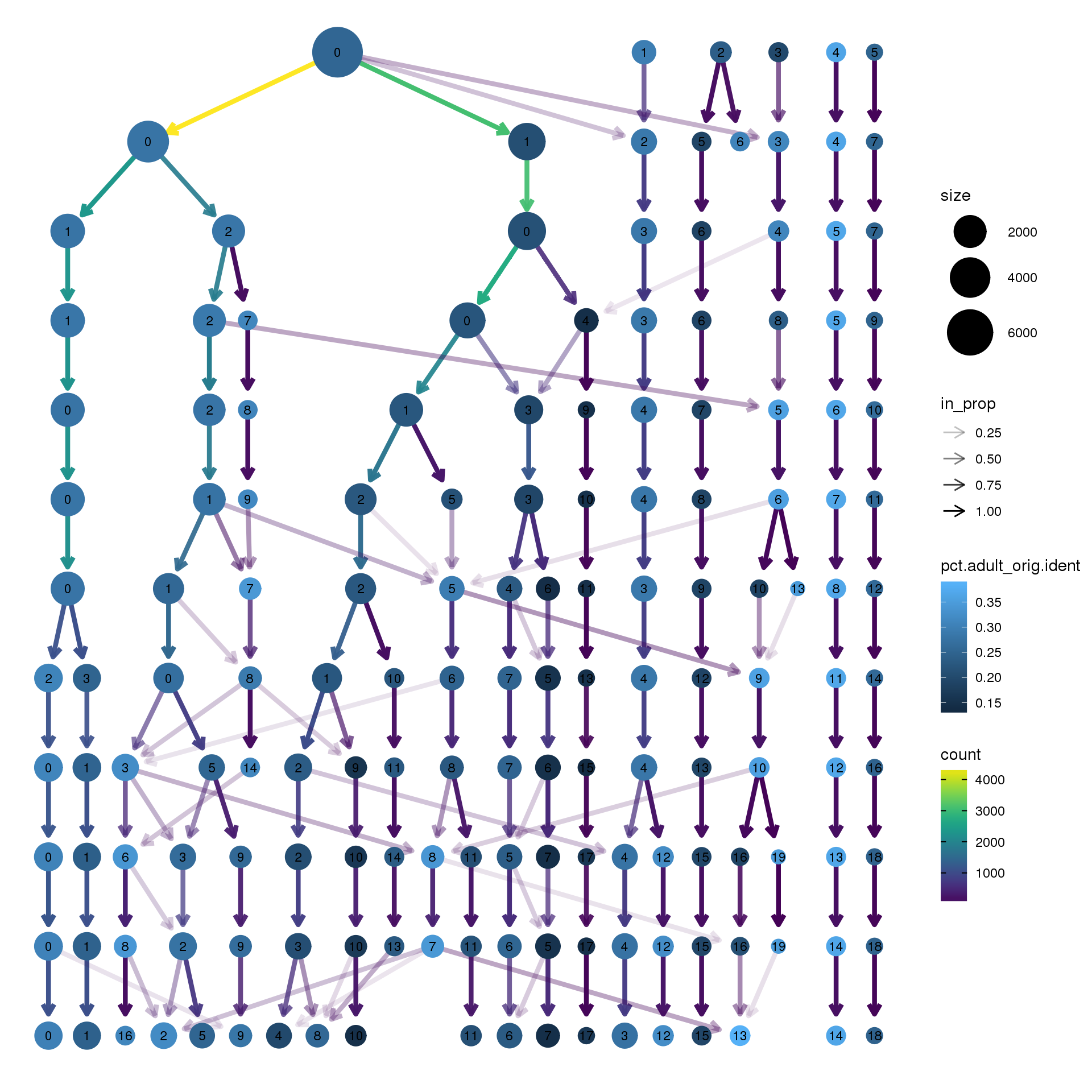
Save Seurat object
DefaultAssay(fibro.integrated) <- "RNA"
Idents(fibro.integrated) <- fibro.integrated$integrated_snn_res.0.1saveRDS(fibro.integrated,file="./output/RDataObjects/fibro-int-FYA-filtered.Rds")
#fibro.integrated <- readRDS(file="./output/RDataObjects/fibro-int-FYA.Rds")
# Load unfiltered counts matrix for every sample (object all)
load("./output/RDataObjects/all-counts.Rdata")columns(org.Hs.eg.db) [1] "ACCNUM" "ALIAS" "ENSEMBL" "ENSEMBLPROT"
[5] "ENSEMBLTRANS" "ENTREZID" "ENZYME" "EVIDENCE"
[9] "EVIDENCEALL" "GENENAME" "GO" "GOALL"
[13] "IPI" "MAP" "OMIM" "ONTOLOGY"
[17] "ONTOLOGYALL" "PATH" "PFAM" "PMID"
[21] "PROSITE" "REFSEQ" "SYMBOL" "UCSCKG"
[25] "UNIGENE" "UNIPROT" ann <- AnnotationDbi:::select(org.Hs.eg.db,keys=rownames(all),columns=c("SYMBOL","ENTREZID","ENSEMBL","GENENAME","CHR"),keytype = "SYMBOL")
m <- match(rownames(all),ann$SYMBOL)
ann <- ann[m,]
table(ann$SYMBOL==rownames(all))
TRUE
33939 mito <- grep("mitochondrial",ann$GENENAME)
length(mito)[1] 226ribo <- grep("ribosomal",ann$GENENAME)
length(ribo)[1] 198missingEZID <- which(is.na(ann$ENTREZID))
length(missingEZID)[1] 10530Find Markers
# Limma-trend for DE
m <- match(colnames(fibro.integrated),colnames(all))
all.counts <- all[,m]chuck <- unique(c(mito,ribo,missingEZID))
length(chuck)[1] 10875all.counts.keep <- all.counts[-chuck,]
ann.keep <- ann[-chuck,]
table(ann.keep$SYMBOL==rownames(all.counts.keep))
TRUE
23064 numzero.genes <- rowSums(all.counts.keep==0)
#avg.exp <- rowMeans(cpm.DGEList(y.kid,log=TRUE))
#plot(avg.exp,numzero.genes,xlab="Average log-normalised-counts",ylab="Number zeroes per gene")
table(numzero.genes > (ncol(all.counts.keep)-20))
FALSE TRUE
17077 5987 keep.genes <- numzero.genes < (ncol(all.counts.keep)-20)
table(keep.genes)keep.genes
FALSE TRUE
6071 16993 all.keep <- all.counts.keep[keep.genes,]
dim(all.keep)[1] 16993 9097ann.keep <- ann.keep[keep.genes,]y.fibro <- DGEList(all.keep)
logcounts <- normCounts(y.fibro,log=TRUE,prior.count=0.5)
#logcounts.n <- normalizeBetweenArrays(logcounts, method = "cyclicloess")
maxclust <- length(levels(Idents(fibro.integrated)))-1
grp <- paste("c",Idents(fibro.integrated),sep = "")
grp <- factor(grp,levels = paste("c",0:maxclust,sep=""))
design <- model.matrix(~0+grp+fibro.integrated$biorep)
colnames(design)[1:(maxclust+1)] <- levels(grp)
mycont <- matrix(0,ncol=length(levels(grp)),nrow=length(levels(grp)))
colnames(mycont)<-levels(grp)
diag(mycont)<-1
mycont[upper.tri(mycont)]<- -1/(length(levels(factor(grp)))-1)
mycont[lower.tri(mycont)]<- -1/(length(levels(factor(grp)))-1)
# Fill out remaining rows with 0s
zero.rows <- matrix(0,ncol=length(levels(grp)),nrow=(ncol(design)-length(levels(Idents(fibro.integrated)))))
test <- rbind(mycont,zero.rows)
fit <- lmFit(logcounts,design)
fit.cont <- contrasts.fit(fit,contrasts=test)
fit.cont <- eBayes(fit.cont,trend=TRUE,robust=TRUE)
fit.cont$genes <- ann.keep
summary(decideTests(fit.cont)) c0 c1 c2 c3 c4 c5
Down 3249 2017 1287 297 625 186
NotSig 13252 13828 12856 14941 15405 16619
Up 492 1148 2850 1755 963 188treat <- treat(fit.cont,lfc=0.5)
dt <- decideTests(treat)
summary(dt) c0 c1 c2 c3 c4 c5
Down 14 16 47 6 0 0
NotSig 16978 16912 16888 16908 16907 16957
Up 1 65 58 79 86 36par(mfrow=c(2,3))
for(i in 1:ncol(mycont)){
plotMD(treat,coef=i,status = dt[,i],hl.cex=0.5)
abline(h=0,col=colours()[c(226)])
lines(lowess(treat$Amean,treat$coefficients[,i]),lwd=1.5,col=4)
}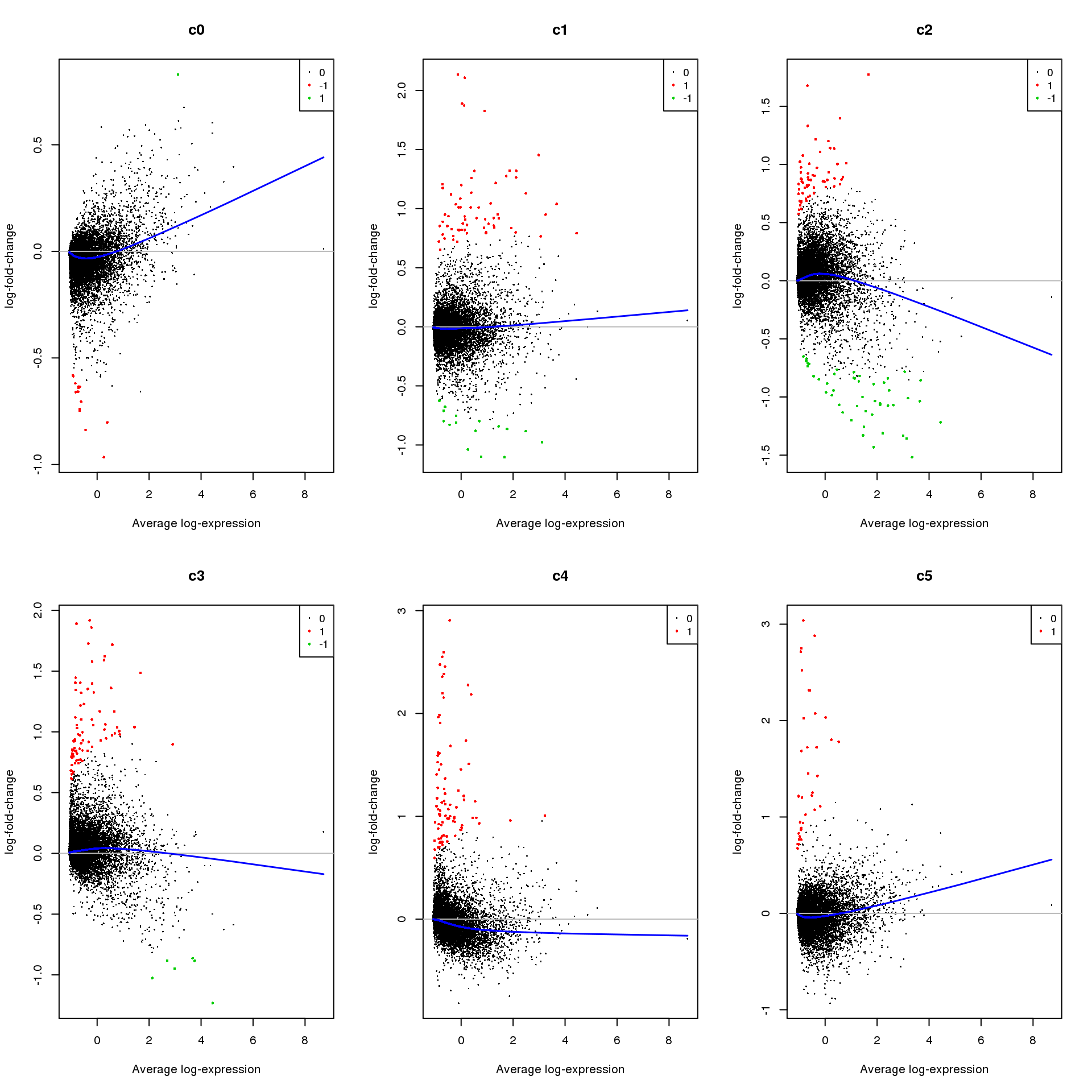
Write out marker genes for each cluster
contnames <- colnames(mycont)
for(i in 1:length(contnames)){
topsig <- topTreat(treat,coef=i,n=Inf)
write.csv(topsig,file=paste("./output/MarkerAnalysis/Fibroblast/Development/DE/Cluster-",contnames[i],".csv",sep=""))
}fdr <- apply(treat$p.value, 2, function(x) p.adjust(x, method="BH"))
output <- data.frame(treat$genes,LogFC=treat$coefficients,AveExp=treat$Amean,tstat=treat$t, pvalue=treat$p.value, fdr=fdr)
write.csv(output,file="./output/MarkerAnalysis/Fibroblast/Development/DE/MarkerAnalysis.csv")Perform gene set testing on C2 and GO sets
contnames <- colnames(mycont)
load("./output/RDataObjects/human_c2_v5p2.rdata")
load("./output/RDataObjects/human_c5_v5p2.rdata")
c2.id <- ids2indices(Hs.c2,treat$genes$ENTREZID)
c5.id <- ids2indices(Hs.c5,treat$genes$ENTREZID)
reactome.id <-c2.id[grep("REACTOME",names(c2.id))]
c2.c0 <- cameraPR(treat$t[,1],c2.id)
reactome.c0 <- cameraPR(treat$t[,1],reactome.id)
go.c0 <- cameraPR(treat$t[,1],c5.id)
for(i in 1:length(contnames)){
write.csv(cameraPR(treat$t[,i],c2.id),file=paste("./output/MarkerAnalysis/Fibroblast/Development/GeneSetTests/c2-",contnames[i],".csv",sep=""))
write.csv(cameraPR(treat$t[,i],reactome.id),file=paste("./output/MarkerAnalysis/Fibroblast/Development/GeneSetTests/reactome-",contnames[i],".csv",sep=""))
write.csv(cameraPR(treat$t[,i],c5.id),file=paste("./output/MarkerAnalysis/Fibroblast/Development/GeneSetTests/go-",contnames[i],".csv",sep=""))
}Check quality of clusters
The quality of the clusters look good.
par(mfrow=c(1,1))
numgenes <- colSums(all.keep!=0)
boxplot(numgenes~grp)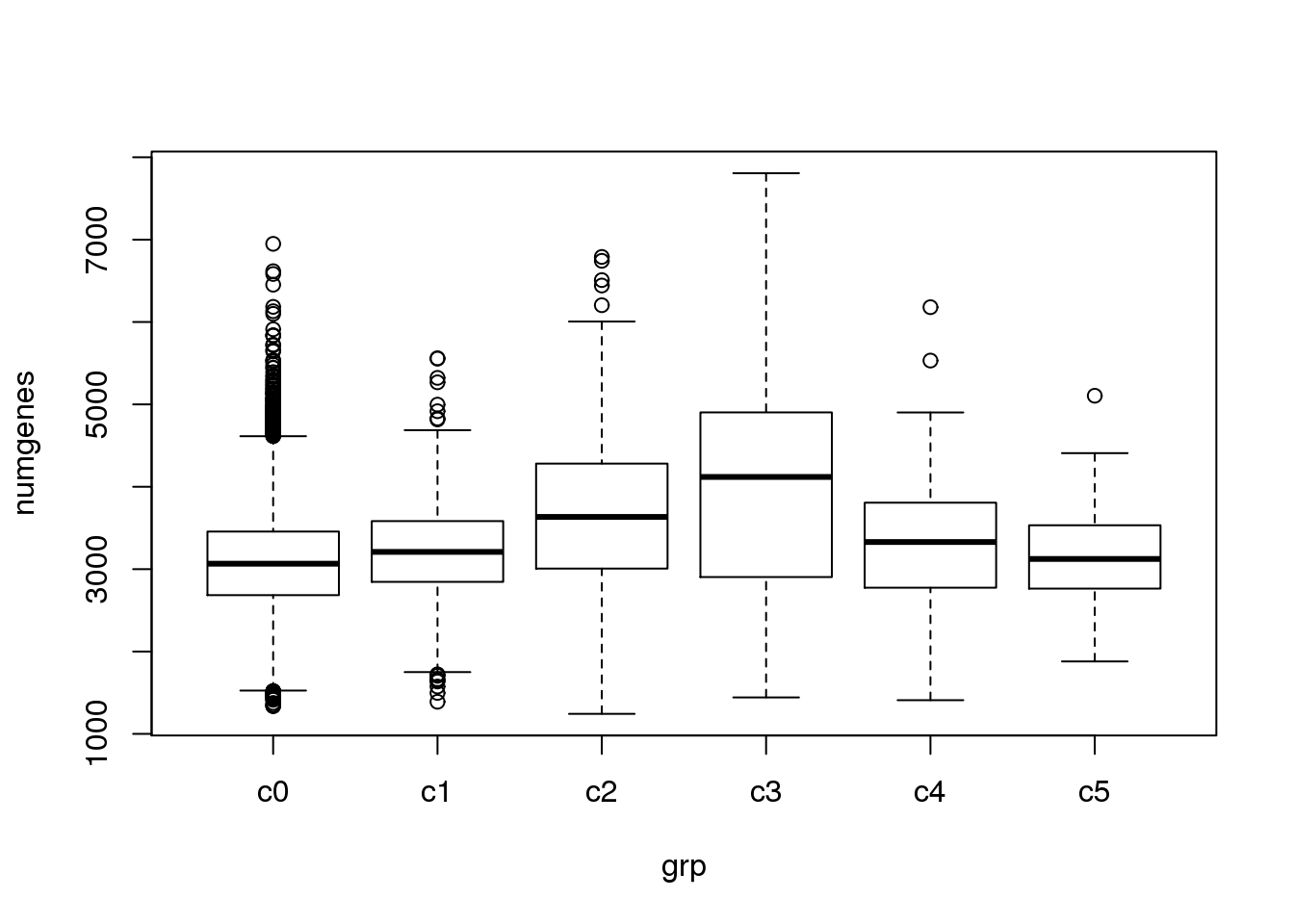
Heatmap of marker genes
sam <- factor(fibro.integrated$biorep,levels=c("f1","f2","f3","y1","y2","y3","a1","a2","a3"))
newgrp <- paste(grp,sam,sep=".")
newgrp <- factor(newgrp,levels=paste(rep(levels(grp),each=9),levels(sam),sep="."))
o <-order(newgrp)
clust <- rep(levels(grp),each=9)
samps <- rep(levels(sam),length(levels(grp)))Summarise expression across cells
sumexpr <- matrix(NA,nrow=nrow(logcounts),ncol=length(levels(newgrp)))
rownames(sumexpr) <- rownames(logcounts)
colnames(sumexpr) <- levels(newgrp)
for(i in 1:nrow(sumexpr)){
sumexpr[i,] <- tapply(logcounts[i,],newgrp,mean)
}sig.genes <- gene.label <- vector("list", length(levels(grp)))
for(i in 1:length(sig.genes)){
top <- topTreat(treat,coef=i,n=Inf)
sig.genes[[i]] <- rownames(top)[top$logFC>0][1:10]
gene.label[[i]] <- paste(rownames(top)[top$logFC>0][1:10],levels(grp)[i],sep="-")
}
csig <- unlist(sig.genes)
genes <- unlist(gene.label)
myColors <- list(Clust=NA,Sample=NA)
myColors$Clust<-sample(ggplotColors(length(levels(grp))),length(levels(grp)))
names(myColors$Clust)<-levels(grp)
myColors$Sample <- sample(ggplotColors(length(levels(sam))),length(levels(sam)))
names(myColors$Sample) <- levels(sam)
pdf(file="./output/Figures/NormalDev/fibro-heatmap-siggenes-summarised-FYA-filtered.pdf",width=20,height=20,onefile = FALSE)
aheatmap(sumexpr[csig,],Rowv = NA,Colv = NA, labRow = genes,
annCol=list(Clust=clust,Sample=samps),
annColors=myColors,
fontsize=16,color="-RdYlBu",
scale="none")
dev.off()png
2 aheatmap(sumexpr[csig,],Rowv = NA,Colv = NA, labRow = genes,
annCol=list(Clust=clust,Sample=samps),
annColors=myColors,
fontsize=16,color="-RdYlBu",
scale="none")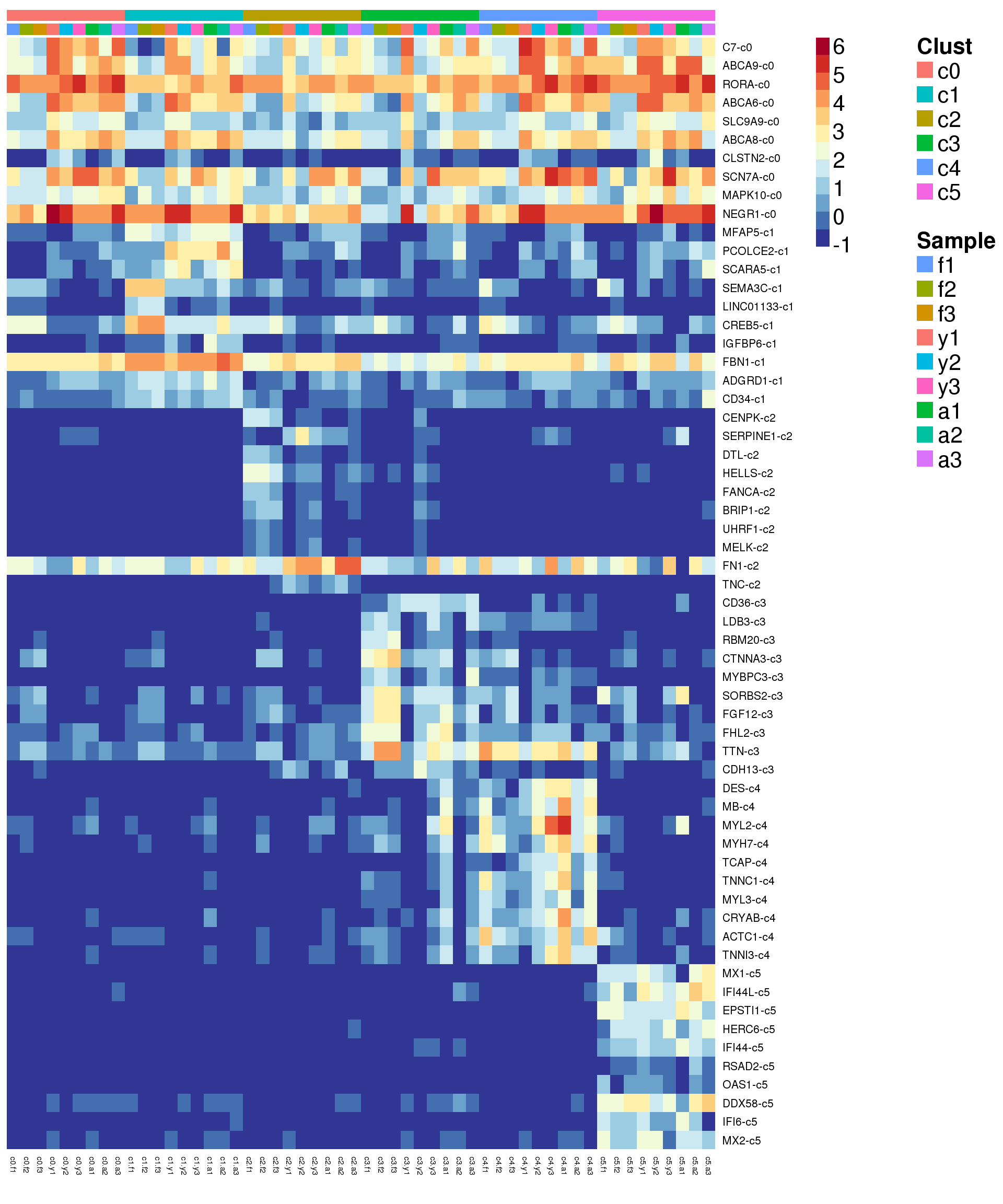
Heatmap of pre-identified heart genes
hm <- read.delim("./data/heart-markers-long.txt",stringsAsFactors = FALSE)
hgene <- toupper(hm$Gene)
hgene <- unique(hgene)
m <- match(hgene,rownames(sumexpr))
m <- m[!is.na(m)]
mycelltypes <- hm$Celltype[match(rownames(sumexpr)[m],toupper(hm$Gene))]
mycelltypes <- factor(mycelltypes)
mygenes <- rownames(sumexpr)[m]
mygenelab <- paste(mygenes,mycelltypes,sep="_")
pdf(file="./output/Figures/NormalDev/fibro-heatmap-hmarkers-summarised-FYA-filtered.pdf",width=20,height=15,onefile = FALSE)
aheatmap(sumexpr[m,],Rowv = NA,Colv = NA, labRow = mygenelab,
annCol=list(Clust=clust,Sample=samps),
# annRow=list(Celltypes=mycelltypes),
annColors=myColors,
fontsize=14,color="-RdYlBu")
dev.off()png
2 aheatmap(sumexpr[m,],Rowv = NA,Colv = NA, labRow = mygenelab,
annCol=list(Clust=clust,Sample=samps),
# annRow=list(Celltypes=mycelltypes),
annColors=myColors,
fontsize=14,color="-RdYlBu")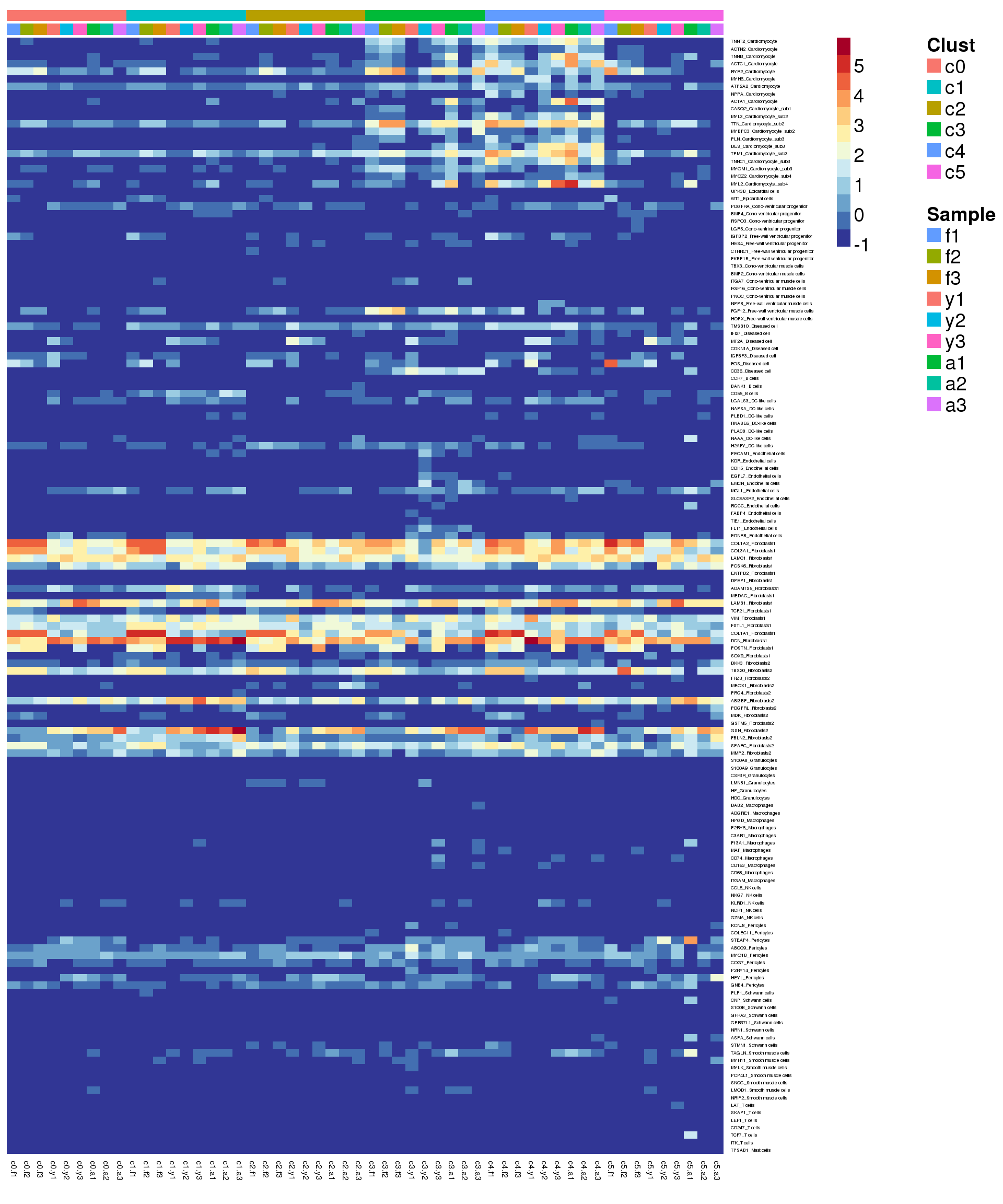
sessionInfo()R version 3.6.0 (2019-04-26)
Platform: x86_64-pc-linux-gnu (64-bit)
Running under: CentOS release 6.7 (Final)
Matrix products: default
BLAS: /usr/local/installed/R/3.6.0/lib64/R/lib/libRblas.so
LAPACK: /usr/local/installed/R/3.6.0/lib64/R/lib/libRlapack.so
locale:
[1] LC_CTYPE=en_US.UTF-8 LC_NUMERIC=C
[3] LC_TIME=en_US.UTF-8 LC_COLLATE=en_US.UTF-8
[5] LC_MONETARY=en_US.UTF-8 LC_MESSAGES=en_US.UTF-8
[7] LC_PAPER=en_US.UTF-8 LC_NAME=C
[9] LC_ADDRESS=C LC_TELEPHONE=C
[11] LC_MEASUREMENT=en_US.UTF-8 LC_IDENTIFICATION=C
attached base packages:
[1] splines parallel stats4 stats graphics grDevices utils
[8] datasets methods base
other attached packages:
[1] dplyr_0.8.3 clustree_0.4.0
[3] ggraph_1.0.2 workflowr_1.3.0
[5] NMF_0.21.0 bigmemory_4.5.33
[7] cluster_2.1.0 rngtools_1.4
[9] pkgmaker_0.27 registry_0.5-1
[11] scran_1.12.0 SingleCellExperiment_1.6.0
[13] SummarizedExperiment_1.14.1 GenomicRanges_1.36.0
[15] GenomeInfoDb_1.20.0 DelayedArray_0.10.0
[17] BiocParallel_1.18.1 matrixStats_0.55.0
[19] cowplot_1.0.0 monocle_2.12.0
[21] DDRTree_0.1.5 irlba_2.3.3
[23] VGAM_1.1-1 ggplot2_3.2.1
[25] Matrix_1.2-17 Seurat_3.0.3.9019
[27] org.Hs.eg.db_3.8.2 AnnotationDbi_1.46.1
[29] IRanges_2.18.1 S4Vectors_0.22.0
[31] Biobase_2.44.0 BiocGenerics_0.30.0
[33] RColorBrewer_1.1-2 edgeR_3.26.3
[35] limma_3.40.2
loaded via a namespace (and not attached):
[1] reticulate_1.13 R.utils_2.9.0
[3] tidyselect_0.2.5 RSQLite_2.1.2
[5] htmlwidgets_1.5 grid_3.6.0
[7] combinat_0.0-8 docopt_0.6.1
[9] Rtsne_0.15 munsell_0.5.0
[11] codetools_0.2-16 ica_1.0-2
[13] statmod_1.4.30 future_1.14.0
[15] withr_2.1.2 colorspace_1.4-1
[17] fastICA_1.2-2 knitr_1.25
[19] ROCR_1.0-7 gbRd_0.4-11
[21] listenv_0.7.0 labeling_0.3
[23] Rdpack_0.11-0 git2r_0.26.1
[25] slam_0.1-45 GenomeInfoDbData_1.2.1
[27] polyclip_1.10-0 farver_1.1.0
[29] bit64_0.9-7 pheatmap_1.0.12
[31] rprojroot_1.3-2 vctrs_0.2.0
[33] xfun_0.10 R6_2.4.0
[35] doParallel_1.0.15 ggbeeswarm_0.6.0
[37] rsvd_1.0.2 locfit_1.5-9.1
[39] bitops_1.0-6 assertthat_0.2.1
[41] SDMTools_1.1-221.1 scales_1.0.0
[43] beeswarm_0.2.3 gtable_0.3.0
[45] npsurv_0.4-0 globals_0.12.4
[47] tidygraph_1.1.2 rlang_0.4.0
[49] zeallot_0.1.0 lazyeval_0.2.2
[51] checkmate_1.9.4 yaml_2.2.0
[53] reshape2_1.4.3 backports_1.1.5
[55] tools_3.6.0 gridBase_0.4-7
[57] gplots_3.0.1.1 dynamicTreeCut_1.63-1
[59] ggridges_0.5.1 Rcpp_1.0.2
[61] plyr_1.8.4 zlibbioc_1.30.0
[63] purrr_0.3.2 RCurl_1.95-4.12
[65] densityClust_0.3 pbapply_1.4-1
[67] viridis_0.5.1 zoo_1.8-6
[69] ggrepel_0.8.1 fs_1.3.1
[71] magrittr_1.5 data.table_1.12.4
[73] lmtest_0.9-37 RANN_2.6.1
[75] whisker_0.3-2 fitdistrplus_1.0-14
[77] lsei_1.2-0 evaluate_0.14
[79] xtable_1.8-4 sparsesvd_0.1-4
[81] gridExtra_2.3 HSMMSingleCell_1.4.0
[83] compiler_3.6.0 scater_1.12.2
[85] tibble_2.1.3 KernSmooth_2.23-15
[87] crayon_1.3.4 R.oo_1.22.0
[89] htmltools_0.4.0 tidyr_0.8.3
[91] DBI_1.0.0 tweenr_1.0.1
[93] MASS_7.3-51.4 R.methodsS3_1.7.1
[95] gdata_2.18.0 metap_1.1
[97] igraph_1.2.4.1 pkgconfig_2.0.3
[99] bigmemory.sri_0.1.3 plotly_4.9.0
[101] foreach_1.4.7 vipor_0.4.5
[103] dqrng_0.2.1 XVector_0.24.0
[105] bibtex_0.4.2 stringr_1.4.0
[107] digest_0.6.21 sctransform_0.2.0
[109] RcppAnnoy_0.0.12 tsne_0.1-3
[111] rmarkdown_1.14 DelayedMatrixStats_1.6.0
[113] gtools_3.8.1 nlme_3.1-141
[115] jsonlite_1.6 BiocNeighbors_1.2.0
[117] viridisLite_0.3.0 pillar_1.4.2
[119] lattice_0.20-38 httr_1.4.1
[121] survival_2.44-1.1 glue_1.3.1
[123] qlcMatrix_0.9.7 FNN_1.1.3
[125] png_0.1-7 iterators_1.0.12
[127] bit_1.1-14 ggforce_0.3.0
[129] stringi_1.4.3 blob_1.2.0
[131] BiocSingular_1.0.0 caTools_1.17.1.2
[133] memoise_1.1.0 future.apply_1.3.0
[135] ape_5.3